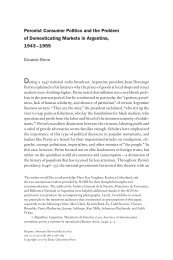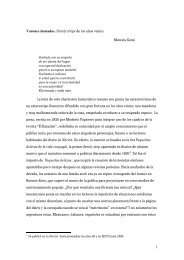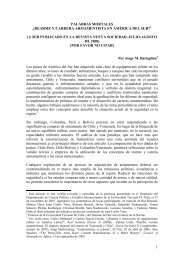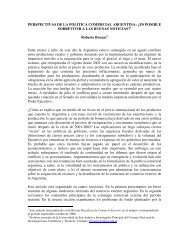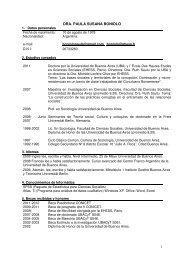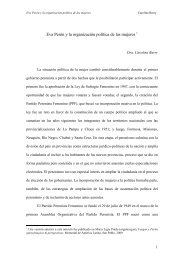Restricted mobility and fixed-mobile convergence in Brazil
Restricted mobility and fixed-mobile convergence in Brazil
Restricted mobility and fixed-mobile convergence in Brazil
You also want an ePaper? Increase the reach of your titles
YUMPU automatically turns print PDFs into web optimized ePapers that Google loves.
2008, those with less than 150,000 <strong>in</strong>habitants represented only 2.2 percent of the total<br />
amount of Embratel Livre users <strong>in</strong> <strong>Brazil</strong>. Figure 1 reveals the growth of Embratel Livre<br />
despite the overall stagnation <strong>in</strong> <strong>fixed</strong> services <strong>in</strong> <strong>Brazil</strong>.<br />
Embratel depends on FWA/WLL technologies for its low-cost bus<strong>in</strong>ess model to attract<br />
urban low-<strong>in</strong>come customers (<strong>in</strong> particular the elderly). Its flagship subscriptionless service,<br />
Embratel Livre, is presented as allow<strong>in</strong>g what the operator calls ‘‘neighborhood <strong>mobility</strong>’’.<br />
While less threaten<strong>in</strong>g to <strong>mobile</strong> operators than the orig<strong>in</strong>al Vésper service, the model<br />
cont<strong>in</strong>ues to pose difficult regulatory questions, which Anatel has attempted to address, as<br />
discussed below.<br />
Local<br />
Figure 1 The growth of Embratel Livre<br />
The last case study relates to the use of GSM cellular technology to provide <strong>fixed</strong> telephony,<br />
<strong>and</strong> comb<strong>in</strong>es the challenge of a new entrant (Vésper case) with the success of a<br />
well-planned bus<strong>in</strong>ess model (Embratel Livre). Moreover, it clearly demonstrates the<br />
opportunities opened up by FWA/WLL technologies for small-scale operators to enter<br />
markets of little <strong>in</strong>terest to traditional operators, comb<strong>in</strong><strong>in</strong>g local entrepreneurship,<br />
<strong>in</strong>novative bus<strong>in</strong>ess models <strong>and</strong> low-cost technologies (Galper<strong>in</strong> <strong>and</strong> Bar, 2006).<br />
Local is the commercial name of the <strong>fixed</strong> telephone service provided by Local Serviços de<br />
Telecomunicações S.A., a subsidiary of the North American operator Ruralfone. In 2004 the<br />
operator was authorized to provide STFC <strong>in</strong> regions 85 to 88 of the General Plan of National<br />
Codes, correspond<strong>in</strong>g to the states of Ceará, Pernambuco <strong>and</strong> northern Piauí <strong>in</strong><br />
northeastern <strong>Brazil</strong>, a region characterized by low GDP <strong>and</strong> low population density<br />
(Macêdo, 2008). The service was launched on May 2005 <strong>in</strong> the city of Quixadá <strong>in</strong> the state of<br />
Ceará, a city of approximately 74,000 <strong>in</strong>habitants with a GDP per capita of less than 1/3 of<br />
the national average (IBGE, 2008). After three years of operation, Local had 2,600<br />
subscribers, surpass<strong>in</strong>g the customer base of local <strong>in</strong>cumbent Telemar (2,500 subscribers),<br />
which resulted <strong>in</strong> a teledensity <strong>in</strong>crease of 70 percent dur<strong>in</strong>g the period.<br />
Between 2005 <strong>and</strong> 2009, Local exp<strong>and</strong>ed its network to three more h<strong>in</strong>terl<strong>and</strong> cities:<br />
Quixeramobim (2006), Russas (2008) <strong>and</strong> Aracati (2008). Lack of f<strong>in</strong>anc<strong>in</strong>g prevented Local<br />
from reach<strong>in</strong>g 17 cities by the end of 2008 as orig<strong>in</strong>ally planned. Yet <strong>in</strong> 2008 the operator<br />
secured a US$ 3.5 million loan from the International F<strong>in</strong>ance Corporation (IFC), which was<br />
VOL. 13 NO. 1 2011 j<strong>in</strong>foj PAGE 37



